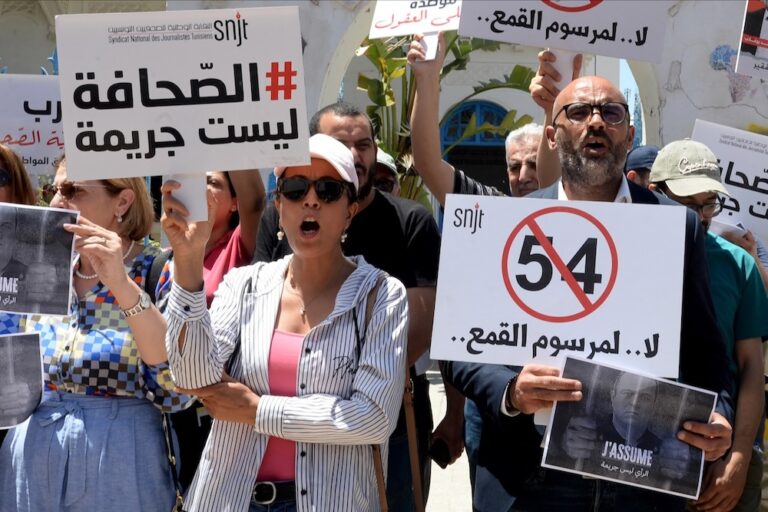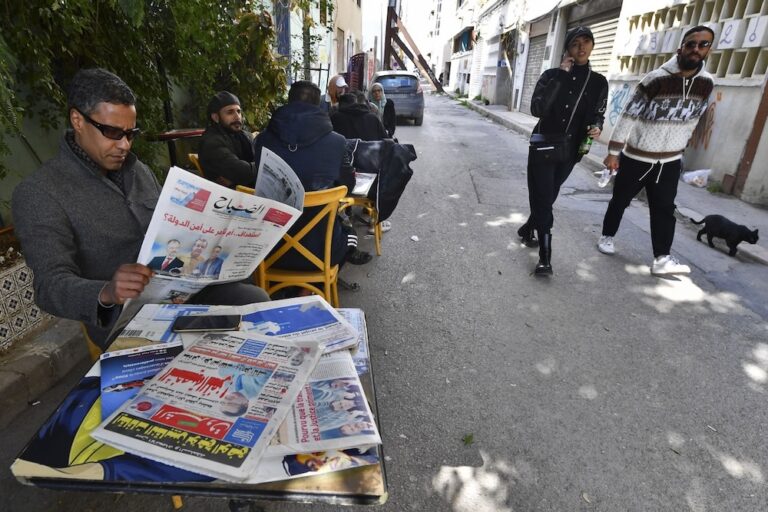"Secularism, If God Wills" was presented during an evening in support of Tunisians who have been assaulted, threatened, and denounced by persons who consider their artistic creations offensive to Islam.
(Human Rights Watch/IFEX) – Tunis, 30 June 2011 – Police were slow to respond to violent protesters who broke into a Tunis cinema showing a controversial documentary on June 26, 2011, and who attacked theatergoers, Human Rights Watch said today. The dismissive response by the police to requests for assistance was a failure to protect the right to free expression, Human Rights Watch said.
Several dozen protesters forced their way into the screening of a film on atheism in Tunisia, Secularism, If God Wills. The film was part of a cultural evening at the AfricARt Cinema, sponsored by the Arab Institute for Human Rights and organized by Closing Ranks (Lam Echaml), a collective of Tunisian associations and creative artists. The evening’s program, called “Hands Off Our Artists,” was presented in support of Tunisians who have been assaulted, threatened, and denounced by persons who consider their artistic creations offensive to Islam.
“Tunisian police should have moved quickly to protect the audience and organizers of the film,” said Sarah Leah Whitson, Middle East and North Africa director at Human Rights Watch. “The government – including the police – have a duty to protect the right of Tunisians to create and view art, whatever its point of view and however offensive it may be to others.”
The police nearby were aware of the threat to the film screening but took no action to deter violence and responded to the attack without urgency, Human Rights Watch said. Police who visited the scene before the protest suggested to the organizers that they cancel the film, the organizers said, rather than move to protect the cinema from potential violence. Artists who tried to summon the police when the attack began said they were met with dismissive comments about their purported opposition to the former government and the security forces.
Online commentators, including on Facebook, have vilified the documentary under its former title, Neither Allah Nor Master (Ni Allah ni Maître) and its director, Nadia al-Fani, a Franco-Tunisian, largely because al-Fani has openly declared her atheism in interviews on Tunisian television and made it the subject of her film. Al-Fani has received numerous online death threats.
Organizers of the event told Human Rights Watch that they had provided local authorities advance notice of the event, as required by law. One of the organizers, Mounir Baâziz, the president of the Association of Tunisian Filmmakers (Association des Cinéastes Tunisiens), said that a colleague had phoned the police earlier in the afternoon when the organizers noticed some men outside the cinema who aroused their suspicions. At about 4 p.m., two plainclothes policemen arrived. When the organizers told them the subject of the film, the policemen advised them not to show it, Baâziz told Human Rights Watch.
A short time later, a crowd of men and women formed in front of the cinema chanting “Allah is Great,” and “There is no God but Allah and Muhammad is His Messenger.” Some carried black flags bearing the latter phrase. The protest, which lasted about 30 minutes, can be seen in a video clip posted online.
Although the theater is less than 100 meters from the nearest police station and the interior ministry headquarters and the street is typically heavily policed, police did not arrive to protect theatergoers until after the protesters had smashed the doors and assaulted patrons inside.
(. . .)


